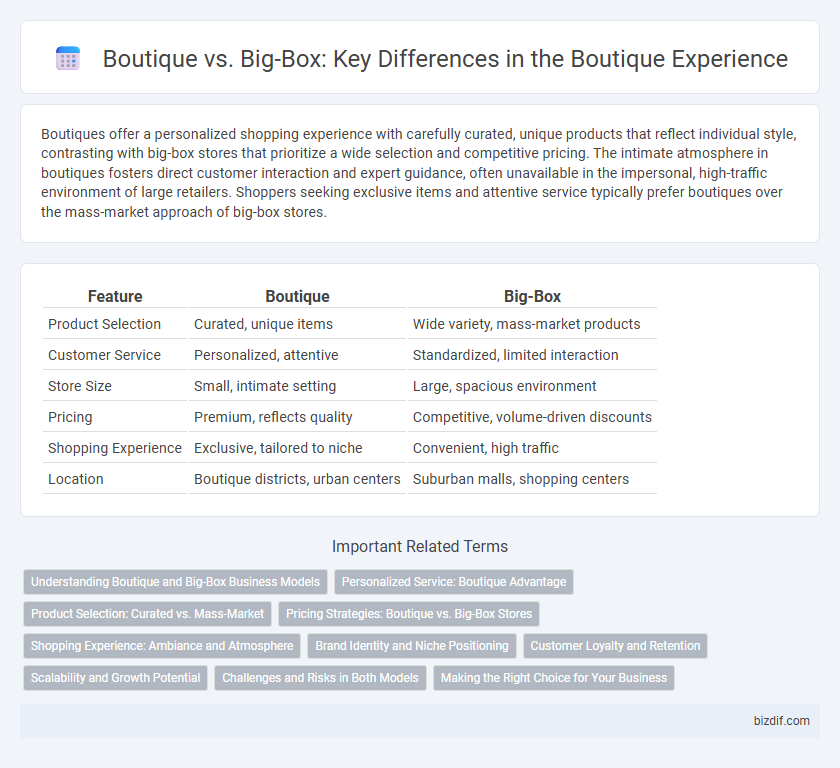Boutiques offer a personalized shopping experience with carefully curated, unique products that reflect individual style, contrasting with big-box stores that prioritize a wide selection and competitive pricing. The intimate atmosphere in boutiques fosters direct customer interaction and expert guidance, often unavailable in the impersonal, high-traffic environment of large retailers. Shoppers seeking exclusive items and attentive service typically prefer boutiques over the mass-market approach of big-box stores.
Table of Comparison
| Feature | Boutique | Big-Box |
|---|---|---|
| Product Selection | Curated, unique items | Wide variety, mass-market products |
| Customer Service | Personalized, attentive | Standardized, limited interaction |
| Store Size | Small, intimate setting | Large, spacious environment |
| Pricing | Premium, reflects quality | Competitive, volume-driven discounts |
| Shopping Experience | Exclusive, tailored to niche | Convenient, high traffic |
| Location | Boutique districts, urban centers | Suburban malls, shopping centers |
Understanding Boutique and Big-Box Business Models
Boutique businesses emphasize personalized customer experiences, unique product offerings, and niche market focus, leveraging high-quality craftsmanship and curated selections to differentiate from competitors. Big-box retailers operate on large-scale, low-margin strategies, prioritizing extensive inventory, broad product categories, and competitive pricing to attract mass-market consumers. Understanding these fundamental differences helps businesses tailor marketing strategies and optimize operational models for either specialized or volume-driven retail success.
Personalized Service: Boutique Advantage
Boutique stores excel in personalized service by offering tailored shopping experiences that cater to individual customer preferences and needs, fostering strong customer relationships. Unlike big-box retailers, boutiques provide curated product selections and attentive, knowledgeable staff who assist buyers with expert advice and customized recommendations. This personalized approach enhances customer satisfaction and loyalty, giving boutiques a distinct competitive advantage in the retail market.
Product Selection: Curated vs. Mass-Market
Boutiques offer a carefully curated product selection tailored to niche markets, emphasizing unique, high-quality items that reflect specific customer preferences. In contrast, big-box stores stock mass-market products designed to appeal to a broad audience, prioritizing quantity and variety over exclusivity. This focused curation in boutiques often results in a more personalized shopping experience and distinct product offerings.
Pricing Strategies: Boutique vs. Big-Box Stores
Boutique stores often adopt value-based pricing strategies, emphasizing quality, exclusivity, and personalized services to justify higher price points. Big-box stores leverage economies of scale and cost leadership strategies, enabling them to offer lower prices through bulk purchasing and streamlined operations. Customer perception in boutiques aligns with premium pricing, while big-box retailers attract price-sensitive shoppers through frequent promotions and discounts.
Shopping Experience: Ambiance and Atmosphere
Boutiques offer a personalized shopping experience with carefully curated ambiance and intimate atmosphere, often featuring unique decor and attentive customer service that create a sense of exclusivity. Big-box stores prioritize efficiency and volume, resulting in a more utilitarian environment with bright lighting and wide aisles designed for high traffic flow. The distinctive boutique ambiance enhances customer engagement and brand loyalty, whereas big-box stores focus on convenience and accessibility.
Brand Identity and Niche Positioning
Boutiques excel in brand identity through curated, unique product selections that reflect distinct lifestyles and customer values, creating strong emotional connections. Unlike big-box retailers, boutiques focus on niche positioning by targeting specific market segments with personalized services and exclusive offerings. This tailored approach fosters customer loyalty and enhances perceived brand value in competitive retail landscapes.
Customer Loyalty and Retention
Boutiques excel in fostering customer loyalty and retention through personalized service and curated product selections that resonate with individual preferences. Unlike big-box stores, boutiques create a unique shopping experience that encourages repeat visits and emotional connections with the brand. This tailored approach drives higher customer satisfaction and long-term loyalty compared to the transactional nature of large retail chains.
Scalability and Growth Potential
Boutiques offer personalized customer experiences and niche market specialization that large big-box stores often struggle to replicate, fostering strong brand loyalty and higher customer retention. Scalability for boutiques typically involves carefully expanding product lines and enhancing service quality to maintain exclusivity, whereas big-box retailers scale through volume and extensive supply chains, often sacrificing personalization. Growth potential in boutiques lies in targeted market segments and digital presence optimization, making them agile in adapting trends compared to the standardized expansion strategies of big-box chains.
Challenges and Risks in Both Models
Boutiques face challenges such as limited economies of scale, higher per-unit costs, and dependency on niche markets, which can lead to financial instability and slower growth. Big-box stores confront risks including intense competition, supply chain complexities, and vulnerability to market fluctuations due to their vast inventory and operational scale. Both models must navigate evolving consumer preferences and technological advancements that impact retail effectiveness and profitability.
Making the Right Choice for Your Business
Boutique stores offer personalized customer experiences and curated product selections that differentiate them from big-box retailers focused on high-volume sales and broad inventory. Choosing the right business model depends on your target market, brand identity, and investment capacity, with boutiques excelling in niche markets and big-box stores benefiting from economies of scale. Analyzing consumer preferences and operational goals ensures a strategic fit between your business approach and competitive positioning.
Boutique vs Big-Box Infographic

 bizdif.com
bizdif.com